Florida's Doral, mostly Hispanic city, votes to join immigration enforcement partnership with ICE
Published in News & Features
DORAL, Fla. — The Doral City Council unanimously gave the local police department the green light Wednesday to give its officers immigration enforcement powers as part of an agreement with the federal government.
The council — composed of immigrants or children of immigrants — approved a resolution authorizing the city to partner with Immigration and Customs Enforcement through a federal program known as 287(g).
Doral joins Coral Gables, Hialeah, West Miami and Miami Springs as the latest Miami-Dade municipality to align with the Trump administration’s hard-line immigration agenda. Seventy percent of Doral’s population is foreign-born, and Venezuelans make up over a third of the residents.
While no formal agreement with ICE has been signed yet, the resolution marks a significant first step toward deeper cooperation with federal immigration authorities, signaling a shift that could have major implications for the city’s large immigrant population.
City officials argue that the resolution is in line with obligations under Florida law. But while state law requires operators of county jails to join 287(g) programs, nothing explicitly requires cities to do so. The city of South Miami asked a judge to clarify whether local governments are required to join the program amid pressure from Gov. Ron DeSantis.
Doral Mayor Christi Fraga, a Republican official with ties to the Trump administration, told reporters shortly before the City Council approved the resolution that it was “morally” challenging for the city to enter the agreement. She said that the city does not have the resources to enforce immigration law and that it is not its duty.
“We were the first to raise the voices of residents who have come to contribute positively to this community, and we know they are the majority.” Fraga said. “And I can assure you that our police department is here to serve every resident of this community.”
During the vote, Fraga said the resolution is giving direction for the city’s legal department and administration to enter into a letter of understanding with ICE, but not the actual memorandum of understanding. The resolution states that the city intends to enter into an agreement that complies with Florida law while remaining within the limits of the city’s budget.
“Our job is to continue to raise the voices of those that we know that come here to do the right thing. Those who are here following the law. Those who are here to provide, to be productive members of our society,” Fraga said.
Doral police Chief Edwin Lopez told the council that so far his department has not been asked to assist in any immigration enforcement activities.
“The primary focus of our officers during interactions with the public is not to question anyone’s immigration status. Our mission is to serve and protect every member of this community, regardless of their immigration background,” Lopez said. “However, during investigations — especially those involving serious criminal activity — if it’s discovered that an individual is in the country illegally, that could result in additional charges.”
In 2012, the Obama administration killed the “task force model” of the 287(g) program, which allows police officers to stop, question and detain people suspected of violating immigration laws, because it had led to racial profiling and discrimination against Hispanics in Arizona and North Carolina. Trump resurrected that version of the program, with law enforcement agencies in Florida signing over 100 task force model agreements since February. Immigrant rights advocates have warned that 287(g) would lead to racially biased and illegal policing.
Doral Councilman Rafael Pineyro, who was born in Venezuela, said he doesn’t believe that someone should be targeted because of how they look.
“I will certainly make sure that we have heard from my colleagues as well, to ensure that our police department certainly keeps acting with dignity and upholding the rights of everyone in our community,” he said. “We’re not proposing this, we are just following the law. But at the same time we are here to make sure not only that we’re following the law, but that we’re going to make sure that this is done the right way, this is not just a blank check that we’re signing to the state of Florida.”
Political pressure from DeSantis and state Attorney General James Uthmeier has loomed large over local government officials’ heads. In Fort Myers, for example, city officials initially rejected a similar partnership with ICE but reversed course after threats from Uthmeier, who warned the officials they had to join the program to comply with “sanctuary city” laws, which ban officials from limiting cooperation with the federal government on immigration enforcement or risk possible suspension.
This week, Uthmeier also issued a warning to Orlando Mayor Buddy Dyer for allegedly supporting “sanctuary city” policies, a stance now considered unlawful under state law. Dyer responded saying neither he nor the Orlando Police Department had intention of violating federal and state law. Seven years ago, Dyer said that he wanted to do everything possible to support “those who feel vulnerable because of their immigration status.”
Lorenzo Cobiella, Doral’s city attorney, noted that while the Florida attorney general’s opinions on 287(g) agreements are not legally binding, they are considered persuasive. “Most local governments tend to follow their lead,” he said.
Given Uthmeier’s interpretation, Cobiella recommended that the council approve the 287(g), emphasizing the legal pressure from the state.
“We all have families who come from places experiencing great suffering and uncertainty,” he said. “Nevertheless, we each took an oath to uphold the law. And in this case, our discretion is extremely limited — the state is mandating certain actions, and if we fail to comply, we’re being threatened with criminal penalties.”
City officials recently traveled to Tallahassee to request over $2.7 million in funding for the Doral Police Department — including $1.5 million for a mobile unit, $500,000 to cover overtime tied to a visit by the president to his Trump National Doral resort and $700,000 for drones. The city officials told the Miami Herald because the funding would come from the state, they were advised that being in compliance with the ICE partnership agreement was strongly recommended by the time the funding is approved.
Doral Vice Mayor Maureen Porras, an immigration attorney who was born in Nicaragua, said she had practiced law in jurisdictions where the agreement already existed, and said she does not think that city’s police department is going to engage in anything that would violate “due process rights or discriminatory behavior.”
She acknowledged there is political pressure, and she said if the city doesn’t enter into an agreement, “it will hurt us.”
Opposition from residents and advocates
Doral residents and immigrant-rights advocates showed up Wednesday morning to oppose the measure. They raised concerns about racial profiling under the program and what it could mean for Doral, which has the largest population of Venezuelan immigrants of any city in the United States. Some said they are concerned that the 287(g) program would erode community trust in police and that victims wouldn’t call authorities when they need help.
“This isn’t just a policy. It’s a gateway to fear, family separation, and racial profiling in a city that thrives on the courage and resilience of immigrants,” said Zohra Khorashi, a lawyer who described herself as a daughter of immigrants.
Laura Kelley, a longtime Doral resident and immigration attorney who is currently chair of the Miami-Dade County Democratic Party, said that a 287(g) agreement would make the city vulnerable to costly litigation and public backlash.
Immigrant-rights advocates say that communities like Doral, where many recently arrived people from Venezuela and elsewhere have settled, would be hurt the most under these agreements. More than 30,000 Doral residents are Venezuelan. Many of them are in legal limbo or only have temporary protection from deportation. That includes asylum-seekers, beneficiaries of temporary protected status, and people who entered the country under parole programs put in place by former President Joe Biden.
Adelys Ferro, executive director of the Venezuelan American Caucus, said the agreement could put thousands of lives at risk in Doral.
“Many fled political persecution. Not just seeking opportunity, but survival. Now this city risks becoming a place of fear.”
_____
©2025 Miami Herald. Visit miamiherald.com. Distributed by Tribune Content Agency, LLC.
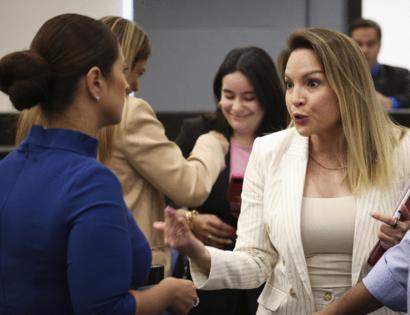
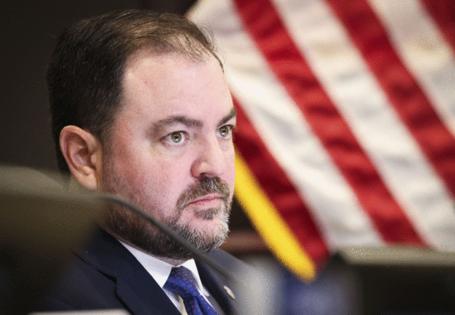
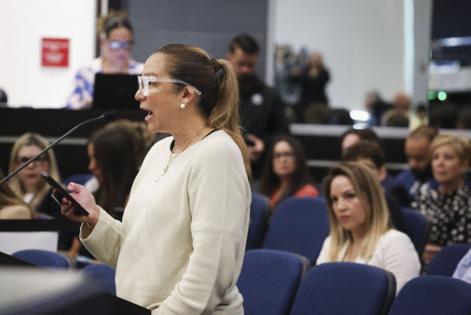
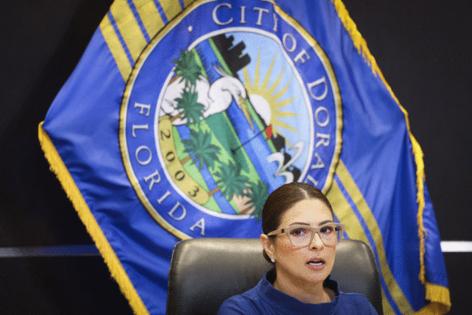
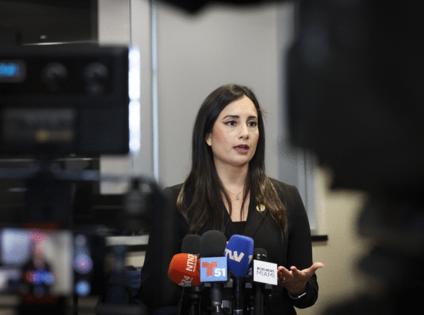











Comments